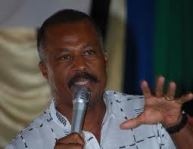Posted by BU Commenter Analyst
2. FTAA plans got scuttled so the USA set up the Central America Free Trade Area (CAFTA) and included the Dominican republic. I believe that the USA is no longer interested in what the ex-British colonies do.. as it is not an economic or security issue, except for illegal drugs.
3. Chavez and Venezuela has put a spanner in the USA plans with his South American initiative where he is promoting ALBA, a trading and investment entity that would promote south American integration – using Venezuela’s oil wealth. We already see island like Dominica moving towards joining that entity. We cannot tell if Chavez will succeed, but his Petro Caribe and ALBA initiatives, however it is obvious that times have changed, and new options are there especially in a Caricom that is weak and ineffective.
4. It may be noted that the EU deal sigbed last December is NOT with Caricom but with each of the countries including the Dominican Republic. .. that form Cariforum. this tells us that they do not consider Caricom as a signatory for the individual countries.
5. I believe that Caricom is a talk shop that makes agreements that are not followed through with action or implementation e.g The Caribbean Court of Justice. I believe that the CSME was created to ensure integration, but it has also been plagued by the same implementation issues where there is no buy-in by every country to ensure its success
6. Then there is the change of governments in the region and a new set of faces in Jamaica, St. Lucia and now Barbados. Are these governments really MORE committed to Caricom or CSME as their predecessors? I would say NO!, based on what I have heard in the news and from speeches. These governments are also occupied with serious internal problems revolving around economic matters and criminal activity that could affect their main industry of TOURISM.
7. Trinidad should have taken a lead role in Caricom and CSME and has not. Petro-Caribe was a wake up call for them but they are only interested in building Trinidad and exporting and investing in the region using the preferential entitlements. Jamaica seems far away from everything and has never taken a lead role recently in any integration movement. P.M. Bruce Golding was never a supporter of CSME so can you expect any interest from him? He has to deal with a country with” the highest murder rate in the world”, according to the Economist magazine.
8. So I think that the CSME king has no clothes and efforts to clothe him at this time will fail. Why? The USA does not care what we do. The drug lords and the crime entities control Trinidad Jamaica and Guyana which are the three largest countries. The economies are all under stress except for Trinidad… but their increasing crime is affecting everything there.
9. In Barbados we have the CSME office which was ably run by ex PM Owen Arthur. The ideals of economic integration were spawned in the days of Barbados’s Barrow and Guyana’s Burnham in the 60’s, 70’s and early 80’s.. Many of its ideals are credible. The issue is always in the level and processes to implementation, and this has been dismal throughout the last 25 years. Lately, the reality of the illicit drugs and crime in many of the islands mentioned earlier does not encourage uncontrolled free movement of populations, irrespective of the arguments of some that immigration is a good thing. The pressure is also on labour competition which would lower wages and standards as well as put pressure on housing, education and health services in some countries. e.g Barbados, which is a small island but with a relatively high standard of living will attract immigrants.
10. Lastly, the new Prime Minister David Thompson of Barbados is now reposible for CSME as Owen Arthur was in the past, since its formation. It would be interesting as see what he does about the “REALITIES of CSME”, as they affect the region and Barbados in particular. It is not an easy decision for him to make as he cannot be seen not to accept the CSME mantra, even though little has been done to ensure an orderly and inclusive approach by ALL of the Caricom members to ensure its success – if that is the agreed wish of the PEOPLE within Caricom.



















Good riddance to a stupid plan from the very start.
Apart from being a ‘feel good’ set of rhetoric from leaders who had no real idea of how to address the REAL issues of productivity, competitiveness and innovation, CSME never made any kind of logical sense. This was always a 1950’s idea.
All the other Caricom countries knew this and acted accordingly….but Barbados wasted millions in pursuing this shadow.
..we changed all our laws so that Barbadians are no longer special in Barbados. Any Tom Dick or Harry can now own our birthrights.
…we wasted time with this dream rather than pursue Public (and Private) Sector Reform
…we removed all immigration controls so that we will end up overburdening our already strained social systems
…Owen dropped the ball.
CSME was doomed from the very start, but Owen Arthur choose to push Barbados into the grave alongside it.
The interesting point to note is the recent public pronouncement by the prime Minister of St. Lucia Stephenson King that they will not move to a position of recognizing the Caribbean Court of Justice (CCJ). The last time I checked the CCJ is an important organ in the promotion of a CSME.
In considering CSME and whether it works for Barbados, one has to consider the alternatives. What would be different if we had no CSME?
We live in a globalised world. The trend in this world is the full removal of all barriers to the free-movement of goods and capital. We are one of the only countries left with exchange controls, high duties and trade preferences.
The trend is also for “reciprocity” (i.e. I will not give you free access if you do not give me free access) and also an end to special pleading of developing countries – this was one of the stumbling blocks at the failed Doha Trade Round. At some point in the future we will be obliged to remove all of our barriers or face new barriers against our exports, capital and labour.
These trends may not be good, and they certainly present us with challenges, but they are also most certainly the new reality.
The alternative to full removal of barriers is a process that readies our economies, businesses and labour for the eventual full removal of barriers, by removing barriers within a smaller area first – CSME. That is the kind way to view CSME.
The EPA with Europe is another attempt to phase in the full removal of trade preferences. Given the alternatives on offer, the EPA was as good as we could get – Europe was under no legal or economic compulsion, only a moral one, to offer anything at all for the shift to international prices for sugar and bananas. In all honesty, Richard Bernal our negotiator should be congratulated – but he wont be.
So, the EPA and CSME are stepping stones towards the eventual destination of the full removal of barriers against the free movement of goods (i.e. lower duties), capital (i.e. no controls) and to a lesser extent labour.
It is not clear that slowing down the CSME does anything. It will not push back the time of when the international community will demand that we remove all barriers with the rest of the world. All that slowing down CSME will do is to make our economies less ready for the full removal of barriers when it comes.
The other alternative, espoused by the PDC, would be to bring down the shutters and reject these world trends. This spells economic stagnation for large countries and would spell annihilation for a country as small as ours. We have only ever been and can only ever be a “trading nation”.
CSME and the EPA are not perfect and they bring challenges but they allow us to ease ourselves into these new trade realities. The only real alternative is to move even faster to trade liberalisation than the rest of CARICOM and while I think we should do so in some areas that we want to be globally competitive, I do not feel that we are ready for that.
Good riddance to a stupid plan from the very start.
…………………………………………………………………….
I am sure our Prime Minister said that we will continue with the implementation of the CSME and he will be the lead spokesperson since Barbados was in the vanguard of this CSME.
David,
The interesting thing about CSME all along, has been that everyone else except OWEN has been giving lip service to the CSME thing.
Did not ALL of them agree to the court about 10 years ago?
Did they not have a launch date all set out?
The court in Trinidad – They join yet?
It is only foolish US that actually ran around wasting time and money.
So what does anyone think that a brilliant Cawmere man like our present PM will say? that he done with dat?!? ….of COURSE we will continue with CSME…just like all the rest of the Caricom countries…which is exactly what Owen should have done…
As to the Gresham position…. keep trying, eventually you must make a strong point…
Here is an interesting view from Edward Seaga on CARICOM and CSME.
Here is what Edward Seaga said a year ago.
==============================
———-Failure of the WI Federation———-
The fundamental reason for the failure of the West Indies Federation was that it was never planned from the bottom up, but from the top down. Hence, the problems of how it would affect the people at the bottom in several ways never became critical until discussions reached near the bottom end of the top-down process. That is when the stage was set for collapse.
The same regional conferences with Heads of Government are now being carried out again, and the same consultation with an external power, this time the European Union rather than the British government, are also proceeding along an obstacle course of conflicting internal differences endeavouring to find common ground before the deadline in July, 2007, when the EU-CARICOM problems must all be solved.
The answer to the lack of authoritative leadership is the establishment of a CARICOM Commission with super powerful public officials appointed to take decisions in prescribed matters as if they were a single regional CARICOM cabinet overriding the national executive of member countries.
Anyone who believes that this would work does not understand the psyche of Caribbean leaders nor, indeed, the people.
Those who argue for this structure point to the functioning, workable example of the European Union, a relatively homogeneous group of nations with all members having broadly similar levels of development.
==============================
http://www.nationnews.com/321631150052245.php
A future PDC Government shall surely withdraw Barbados from the CARICOM Single Market and Economy (CSME), even if it were just struggling to survive, then – which, realistically speaking, though, WILL be bound to happen in the long run.
For, the CSME is an elitist-driven, imperialist-oriented, technocratic-based regional initiative which really and truly has been very conceptually and structurally flawed from the time of its genesis at the CARICOM Heads of Government Conference in Grand Anse, Grenada, in 1989, and as a result of those and other profound organizational and technical flaws, really and truly therefore has been doomed to fail in the said long run. Its 12 or so member states do undoubtedly constitute a farce of truly immense proportions!! Here are at least three reasons why it will surely fail “to deepen economic integration by advancing beyond the common market to a Single Market and Economy”, “to achieve economic mass”, and “to achieve progressive insertion of the region into the global economic and trading system by strengthening trading links with non-traditional partners”, (Wikipedia.org – CARICOM SINGLE MARKET AND ECONOMY:
1) It does not have an independent and lasting supranational political legal organization that would seek to and do represent all the participating states, and that, too, at the same time, would have the overarching power and authority – backed up by military might, to impose its will and ideologies on those participating states that would be subject to its power and authority. Hence, in this case decentralism and the direct/indirect effects of such more than centralism and the direct/indirect effects of such will often be a very prevailing bad mixture, esp. when dealing with the need for these participating states “to deepen this so-called integration process”. Some States are going to simply refuse, with impunity, to deepen aspects of this process, if they know that these aspects will hurt their national or sectoral interests. Thus, a sign of inherent structural and attitudinal weakness in the CSME;
2) It wrongly continues to possess many of those ideological, philosophical, attitudinal and structural perspectives and programs of a Eurocentric nature (Taxation, Interest Rates, Repayable Institutional Loans, Chronic Dependency, Class and Racial Elitism/Hierarchy) that will themselves continue to help bring about so many massive dysfunctions and deficiencies in the individual societies of CARICOM, that to simply reuse and again misapply them over and over in a wider context (the CSME), will certainly mean greater failures for ourselves in these local and wider contexts. Hence, achieving “critical economic mass” will not at any time be possible in a context whereby CSME objectives for achieving such are being seriously undermined and stymied by many of the effects of those Eurocentric perpectives and programs upon which are founded this CSME; and,
3) Like its parent, CARICOM, it does NOT even have command and control of reasonable amounts of trade, investment, currency holdings, technological innovation at the international level, sufficient that it would be a grouping that would be able “to shake” the global political, economic and financial arenas as it likes. Thus, the CSME will remain in the like manner of how the region from the time of its assimilition into this Western-dominated global economic and trading system many centuries ago, would have been long known to be net consumers and receivers of things from the outside moreso than net export producers and givers of region’s things to the outside. At the same time, far from achieving this mythical “gradual progression of the region into the global economic and trading system by strengthening links with non-traditional partners”, this said region will surely see greater marginalization and exploitation of themselves, given 1 and 2 above, as well as via other factors. Some of these non-traditional trading partners, like China, will also be part and parcel of these particular marginalization and exploitation processes. As well, all CSME members will often be subject to serious manipulation, pulling and tugging by bigger state and non-state actors, and will constantly possess deep divisions among themselves on many issues, as that, these members, in the absence of this earlier referred to strong supranational organization, will most likely tend to be mainly about the looking after of their own national and sectoral interests rather than the common interests of the grouping.
Finally, while PDC is NOT against regionalization per se, we must still state that we are for any forms of regionalization that are or will be properly thought out and structured, and that are or will be fostering and securing greater equality and justice, freedom and democracy, wealth and prosperity for the black masses and middle classes of this CARICOM region, first and foremost, before any thing else. CSME, nonsense!!
PDC
Thanks to David and Adrian Hinds for your links regarding Edward Seaga’s comments on Caricom and the CSME. I think the most critical statement is in the first paragraph of “Tthe quote by Seaga, selected by Adrian Hinds:
“The fundamental reason for the failure of the West Indies Federation was that it was never planned from the bottom up, but from the top down. Hence, the problems of how it would affect the people at the bottom in several ways never became critical until discussions reached near the bottom end of the top-down process. That is when the stage was set for collapse.”
It is a real shame when the best brains of the Region are wasted in meaningless meetings, conferences and workshops, (talk-shops)’ I call it the BOONDOGGLE business, It imcludes the governments, most of the aid agencies and the “Consultants”, who ensure that failed entities stay alive long after their usefulness has passed. That is why this region is so messed up… we cannot run anything right it seems…
………………………………………………………………
BOONDOGGL (Wikipedia)
The term boondoggle has come to refer to a government or corporate project involving large numbers of people and usually, heavy expenditure, where at some point the key operators have realized that the project is never going to work, but are reluctant to bring this to the attention of their superiors. Generally there is an aspect of “going through the motions”—for example, continuing research and development—as long as funds are available to keep paying the researchers’ and executives’ salaries. The situation can be allowed to continue for what seem like unreasonably long periods, as senior management are often reluctant to admit that they allowed a failed project to go on for so long. In many cases, the actual device itself may eventually work, but not well enough to ever recoup its development costs.
Does this not soung familiar???
The reason for the failure of The Federation is that the big-island Jamaicans could n’t bear the thought of being governed by small-islanders, pure and simple!! Let’s thank god for sparing us!!!!
Would you seriously, want to be involved in ANYTHING AT ALL, which included Jamaicans?!!!!
You must be joking!!!!
By that selfish decision on their part, WE HAVE BEEN SPARED and shoud rejoice everytime we recall how close we came!!!!
CSME was another attempt to afflict the same disaster upon us!!!! Some Bajans must have a death-wish for our country and region!!!!
Analyst et al so far we have all enjoyed taking pot shots at the CSME concept. How de we propose to draw on the collective wisdom and resources of our small region in the context of a world free market?
We don’t have to state the several common markets around the world which have been established to protect certain interest. These groupings are very evident among developed countries. Ho then does a small group like the English speaking Caribbean with a paucity of resources challenge for a market/competitive position?
THE BIG MYTH: THERE IS A WORLD FREE MARKET.
Those that wish to impose on us to open our markets are doing the opposite themselves. It is just bully-boy tactics, and far rom opening our markets to goods from, say, just Europe, the MFN clauses in the EPA agreements will effectively open our markets to goods from anywhere in the world. This will seriously affect our best prospect for growth, which is trade between developing nations. It was designed as such and we fell for it hook, line, and sinker.
The People’s Democratic Congress ,
There will never be a future PDC Government.
CSME is VERY good for Barbados, and David Thompson is right to continue with it.
Bajan Free Press
Pingback: Global Voices Online » Barbados: CSME
“The other alternative, espoused by PDC, would be to bring down the shutters and reject these world trends. This spells economic stagnation for larger countries and would spell annihilation for a country as small as ours” – a Thomas Gresham.
What does this really mean? Could you, one Thomas Gresham, really explain for the benefit of contributors to this site what that really means? In what context are you really making such statements? For, to us, they certainly do NOT make much sense, as well as the context in which they are placed – a discussion that is basically about the CSME – is a little wrong!!
For, policy measures such as the Abolition of Taxation; the Abolition of Interest Rates; the Abolition of Motor Vehicle Insurance; the Abolition of ALL Exchange Rates Parities with the Barbados Dollar; the Reform of Hire Purchase; Making Institutional Loans for Productive Purposes Non-repayable; Making Imports of Goods and Services Zero-“priced” at all points of entry; Making Exports of Goods and Services paid for in Local Currency/Prices; Making sure that Land Spaces, whether bought, sold, or leased, would be done so at Administrative/Nominal costs – the barring of Foreigners from owning our Land Spaces – they will only be able to lease such; the Implementation of a Regime of Rent Control for Barbados, plus other very serious, rational and progressive measures and outlooks for Barbados – have really been conceptualized and fashioned with a view of making sure that Barbados is able to cushion the worst effects on it of a very rampaging globalization and trade liberalization and currency liberalization agenda; and that Barbados is, et al, NOT ONLY able to successfully redefine, reorient and reposition itself in relationship to those trends and the best opportunities they present for further growth and development of Barbados, BUT ALSO that Barbados is able to emerge stronger and better poised and equipped more than ever before to deal with or manage the political, material, financial, cultural, technological and other challenges, shocks, and opportunities that have been sent forward by those trends, and far bigger countries and regions.
Finally, where the CSME is concerned, these policy measures and their associate underpinning philosophies and rationalizations have in so many ways far superceded or surpassed that most bizarre and absurd concept of a CSME!! As a matter of fact, in our crafting and rationalizing these measures and their relatives we have almost totally refused to use the CSME as a reference point, esp. given that we have strongly felt that it should NEVER have been created in the first place.
PDC
David, the objectives are easily, attainable – just drop Jamaica from the CSME and you’d be 100 times more likely, to achieve success!!!!
Simple!!!!
What can we change in and of ourselves? Can Barbados carry CSME alone? Is it the total of the islands? If the others are not interested or are interested in limited ways, how is CSME then feasible? Would not a rethink be necessary? Is there a real big picture to look at or is that picture an illusion?
These questions are from an average Bajan. Me!
First of all the WI Federation failed because with the exception of Sir Grantley and Robert Bradshaw, WI leaders were more concerned with exploiting their own people and lining their pockets. CSME is an unavoidable necessity. How can the free movement of capital be a bad thing under any circumstance?
Poor wunna!! Caan bear to think the Jamaicans don’t love u!!!! Well, if you’re to dabble in politics u first need to be able to face reality, or you deceive yourselves and possibly, your people!!!!
The Jamaicans have no time for you, EXCEPT TO USE YOU, and u know it, but can’t bring yourselves to admit the fact!!!!
How ridiculous!!!!
For, policy measures such as the Abolition of Taxation; the Abolition of Interest Rates; the Abolition of Motor Vehicle Insurance; the Abolition of ALL Exchange Rates Parities with the Barbados Dollar; the Reform of Hire Purchase; Making Institutional Loans for Productive Purposes Non-repayable;
………………………………………………………………..
With the host of waivers and reductions and freeness that you keep harping on, how will the country make money to pay for social services or more serious, to pay workers.
Come on PDC, this is 2008, not in 1492 when bartering was the order of the day for economic wealth.
We keep talking about CSME, but CSME is like the Federation, and is like Carifta, and is like Caricom. Just a change of words. Nuff long talk, and nuff opposition from member states. Remember, every country is looking at monetary advancement, but surely, not to prop up problematic businesses.
degap // February 6, 2008 at 8:32 am
First of all the WI Federation failed because with the exception of Sir Grantley and Robert Bradshaw, WI leaders were more concerned with exploiting their own people and lining their pockets. CSME is an unavoidable necessity. How can the free movement of capital be a bad thing under any circumstance?
==============================
I feel very confident in saying that Edward Seaga has captured the most poignant reason for any failure in uniting the Caribbean. It all depends of the people, and if the people are not together, and are left out of the process it will fail, or in the least be significantly prolong, and that is the catch 22, as it will take years if not generations to bring about any significant unity between the Indo and afro citizens in Guyana and Trinidad. I am not against the CSME I am against the Top bottom approach of our parliaments making policy that are at odds with the people and does not include the people in a meaningful way. It is common knowledge that the European Union only became a reality as haphazard as it is was due to several member countries ratifying it by parliamentary decree, and where if it had be been put to a referendum public vote, it would not have been an entity today, indeed in those member states where the law required a public vote, if failed. It is time to move beyond the socialist approach to policy and engage the people a little bit more than is the norm within the Caribbean.
Dear David,
You hit the nail on the head, when you wrote that once we have stopped taking pot shots at CSME, the question remains how do we operate in the context of the “world free market” and how do we use the region to our advantage.
What the US and Europeans have been doing is going to countries and forcing them into individual FTAs (Free Trade Agreements). Countries sign them because there are few alternative if they want access for their goods to wider markets. What the CSME was designed to do was threefold (1) provide expanded product and consumer opportunities for our people, forcing our producers to be more competitive, but in a very moderate step (2) allow us to negotiate as one, so that we did not compete with each other for limited preferences (e.g St Vincent offering to sell sugar more cheaply than us to get a bigger allocation, forcing our prices lower too) and (3) buy us sometime with the international community before they force us to lower our duties, which will not only reduce protection for our producers but will also cause a government revenue short-fall.
It is certainly the case that the world trading system is not fair, and that the rich and powerful force free trade in sectors that they are strong in (e.g. financial services, manufacturing) and drag their feet in sectors that they are less strong in (agriculture, textiles, etc). However it is what it is and we have no opportunity to change it. The question is how best to manage it. I was a skeptic initially and I am sure CSME could be improved upon, but it would seem that the alternatives are either too much competition (an FTA with the US and Europe) or too little competition as markets get closed off to us abroad because of our unwillingness to remove protection at home.
David:
Gresham’s law is commonly stated: “Bad money drives out good.” Or, more precisely: “When there is a legal-tender currency, bad money drives good money out of circulation.” Or, more accurately: “Money overvalued by the State will drive money undervalued by the State out of circulation.”
Would the latter-day Thomas Gresham agree that where regional integration is concerned, bad ideas drive out good. Can he state his other comments in a simple theorem.
TG:
You’re finally getting to the nub of the problem.
We are not ever going to be protected by our globalised world partners, their economic strength steamrollers small economies, and ours as an example is minicule.
The first world , to which we misguidedly aspire, will wipe us out, suck us dry, spit out the pips, however you want to say it “We wil get stuffed”.
The time is right for this new government to make its own mark, ignore CSME, Caricom and any other irrelevancies conjured up by the political class, go for self-sufficiency along with any Carib state with the balls to sign up.
Talking shops are not going to feed us, workable partnerships are the way forward.
Sorry, David and your one island chums, but without agricultural assets we will go hungry.
Suck salt, and form realistically economic ties with the potential bread baskets.
Tourism and Financial Services, our twin pillars of economic survival are extremely vulnerable to any downturn in the world economy.
Once again, I say, Food, Water and Energy security should be our government’s primary aim.
the comments have been very interesting, just one correction all member states have signed on to the CCJ in its original jursidiction which means essentially that all member states have recognised the CCJ as the final arbiter in disputes relating to the Revised Treaty of Chaguaramas
Dear Linchh,
The law posthumously ascribed to Sir Thomas Gresham (1519 – 1597) by Mr. MacLeod in 1858, actually has many antecedents, the earliest probably from a poem on the Athenian monetary system from The Frogs by Aristophanes, written in 405 BC, or some 2000 years before Gresham.
Aristophanes was suggesting that not only bad money, but also bad politicians drive out the good.
Are there parallels with CSME and Barbados politics? I doubt it, but you decide. Here is the poem for your amusement and rhyme.
“Oftentimes have we reflected on a similar abuse,
In the choice of men for office, and of coins for common use;
For your old and standard pieces, valued and approved and tried,
Here among the Grecian nations, and in all the world beside,
Recognised in every realm for trusty stamp and pure assay,
Are rejected and abandoned for the trash of yesterday;
For a vile, adulterate issue, drossy, counterfeit and base,
Which the traffic of the city passes current in their place!”
Dear Straight Talk,
You are right that water and energy security are important issues and there is much we can do in conservation and in alternatives that should reduce our import bill.
But the smaller you are the more expensive self-sufficiency is. (Linchh is that a neat enough theorem for you?) So, the smaller we are the more we need trade arrangements.
In fact the region is not as poor a choice for mutual trade arrangements as you might expect. To your sacred trinity: Dominica has water, Trinidad has energy. Guyana (potentially) has food.
The problem is that the simple and desirable objective of a free-trade area has been rolled into more contentious, complicated and cumbersome political objectives.
Our political class often looks to the EU as an example, but we may be learning the wrong lessons. The EU started off as an externally protected, liberalised market area for just Iron and Steel in 195? Integration has come in phases. Perhaps we are trying to do too much in one go and we could be more phased and allow countries to move ahead more rapidly within the region and without, if they wish.
Who knows. What I do know is that we need to strike a balance between (1) the final destination of “free-trade” and globally competitive sectors, (2) buying time for our producers and revenues to ready themselves for this destination and (3) not providing so much protection that we become a high cost, uncompetitive economy. If we can only get it right, potentially (I repeat, potentially) give us this balance.
Andrea Symmonds, you have a golden opportunity to introduce yourself properly and educate us about CSME.
Are you at liberty to respond to the concern expressed here that (1) Barbados has been forging ahead with CSME but the other countries are only paying lip service? (2) CSME is failing because it is being implemented top down and not bottom up?
I have been to a few CSME seminars and workshops and I find that the folks from the Caricom Secretariat and CSME unit speak in vague general terms, that are difficult for me to apply in the real world.
For example – freedom of movement is enshrined in the treaty, but in practice the member states have implemented it to varying degrees. There is still too much red tape involved, and too much uncertainty. Even during World Cup when we were supposed to be moving freely with the security bands, many of the immigration officers in the islands I visited seemed unaware of this. It is time to address the practical issues, if you want people to buy in.
Furthermore, how do you persuade us that global free trade is not designed simply to benefit the developed nations? How do you convince us that global free trade is not already dead, given the strong resistance by large developing nations like Brazil that are essential to its operations? And if this is so, to what end is CSME?
Peltdown Man is right – “THE BIG MYTH: THERE IS A WORLD FREE MARKET.
Those that wish to impose on us to open our markets are doing the opposite themselves.”
Thomas Gresham, as usual you take a text book first world economics theoretical position. The developed nations have been exploiting the rest of us for hundreds of years. Let them do it by force if they want to but let us not bend over and take it willingly.
Dear Frankology,
We last had asked you to follow our contribution in the Barbados Underground’s instalment re Former Minister Lynette Eastmond Hits The Ground Running, in order for you to have got a little understanding as to how the Barbadian state/government, under a PDC Regime, shall be able to finance social, welfare, security, physical, foreign affairs and other “non-revenue generating” infrastructures and facilities of the country, without there being Taxation in place, without there being Interest Rates in place, etc. , and at the same time too in order for you to have begun appreciating how the nation and people of Barbados shall be able to secure unprecedented great and sustainably high levels of growth and development for the Barbadian society, with the correct and proper implementation and management of those kinds of measures under the inspired leadership of A PDC Government.
Quite regrettably, though, either, you did NOT read the information, hence your asking how these kinds of things would be done. Or, you read it, but still do NOT understand it, hence, your asking still how these things would be done. Or, you read it, but you wish still to trivialize the substance of what the information states, hence, your asking derisively how will government finance social services, etc., in such a situation where PDC is writing at this stage about the said correct and proper implementation and management
of those and other measures for the greater good of the country.
Anyhow, so much for the concepts of one being doggedly in pursuit of “higher” knowledge in Barbados, mass education in whatever forms in Barbados, and a good education being one of the fundamental bases informing positive change in human thinking and behaviour in Barbados!!
Finally, Frankology, with regard to your reciting of those particular PDC policy measures that would have been stated above, surely it is NOT a question of “waivers, reductions and freeness” as you so erroneously and falsely think will happen under a PDC Government with regard to these same policies and their implementation and management, BUT surely, as far as we know, it is overwhelmingly a question of the nation and people of Barbados deservedly getting greater and rightful access to what is already theirs, achieving greater equality and justice, greater freedom and democracy, and greater wealth and prosperity in the Barbadian society, given, as is stated and restated earlier, the correct and proper implementation and management of these kinds of policy measures under A PDC Government.
PDC
TG(but not IF):
I was not asking you to parade your scholarship, which, no doubt, is considerable, but by my tongue-in-cheek comment, which incidentally one should be clear in making that the audience understands whether the speaker is talking up or down. After all, to extend my metaphor, bodies do not have cheeks only in the face, so talking can be “lowdown”, or worse yet, down low!
However, I see that in your response to Straight Talk you have begun to state your propositions on regional (actually “sub-sub-regional” as Willie Demas once said) integration in simple terms. Keep it up! One of the challenges confronting CARICOM is getting public buy-in to the integration process. I feel that the “experts” can assist by expressing their propositions in simple terms.
I feel that you will have some difficulty in convincing Brutus, who is a honourable man, that: “The fault, dear Brutus, is not in our stars,
But in ourselves, that we are underlings.”
Dear Brutus,
Glad to converse with you again. I have been fortunate in my career to visit many developing countries in Africa, Asia and the Caribbean. (I have held a leadership position at one of the world’s largest research institutes in poverty and development.) I have witnessed, on the ground, some successful and many failed economic strategies.
The lessons we can learn here in Barbados is that the key route to success is an outward orientation – low and falling barriers to flows of trade, capital and labour. It is sad, but there is no, none, zero, economically successful small state that has achieved success without lowering trade barriers, and the least successful sectors of their economies today are where they left the protection on. Check out the path of Hong Kong, Luxembourg, Singapore, Bermuda, and Taiwan, who were dirt poor in 1960 and are richer per capita than the US today. India went from a country with a Barbadian growth rate of 3-4% for three decades, to near 10% growth rates this decade by lowering barriers to trade and capital. (Growth is the single biggest remover of poverty.)
Every attempt to unplug from the world trading system failed and has been reversed: Nyerere in Tanzania, Nehru in India, Mao in China and many smaller state examples too numerous to mention without making this post too long.
The rich countries use their power to set the rules of the game to suit themselves. But taking our bat away doesn’t help us. A hard-nosed reading of success and failure elsewhere is that we should not be pussy-footing around with CSME. We should go for the jugular and reduce trade protection and lower duties with everybody. I offer a softer approach: use regional free trade to ready the producers, liberalise regulatory, tax and labour policies to grow employment and revenues here and use tax transfers to compensate the losers.
TG:
Hmmm! Seems that like me you are an old man whose bad habits in your youth prevent you from sleeping in your old age. I, too, have a history of national, regional, and international public service.
When you have travelled the World and seen the existence of hard core economic problems don’t you feel that we in the Commonwealth Caribbean are missing the opportunity to surmount what are clearly less intractable challenges by failing fully to commit our physical and intellectual energies to devising real and lasting solutions to them?
I think that people like us will always have problems with today’s young people who can identify social and economic problems rather than be having lived them.
It has been said that 90% of all action is verbal, but sometimes I feel that it is a great pity that talk is too cheap.
TG:
In the penultimate paragraph of my comment, above, I said:
“I think that people like us will always have problems with today’s young people who can identify social and economic problems rather than be having lived them.”
What I intended to say was that today’s young people seem to know of economic and social problems only by reading about them, but have no experience in recognising them, and solving them, on the ground.
It serves me right for not sleeping rather than being awake so early in the morning. But did not Hamlet say:
“To sleep, perchance to dream-
ay, there’s the rub. …For in that sleep of death what dreams may come, /When we have shuffled off this mortal coil, /Must give us pause.”
I think that a lot of problems in the Caribbean economies must certainly give us pause since sometimes they seem to be fatal, but not serious. But, perhaps I am being too cynical.
Thomas Gresham, my response to you is “For what is a man profited, if he shall gain the whole world, and lose his own soul? ”
In the real world there are always two sides to a story, and we know of the 3 handed economist (on the one hand, on the other hand, and on the other hand…)
Thomas Gresham, you should use your considerable expertise and experience to challenge the status quo and the global order advanced by the first world.
However I shall let Joseph Stiglitz do the talking for now:
___________________
Globalisation ‘unfair to poor countries’
Date December 03, 2007
by Stacey Russell
PROFESSOR JOSEPH STIGLITZ came out to the 32nd Sir Winston Scott Memorial Lecture with economic guns blazing, in defence of developing countries disadvantaged in trade with the developed world.
In his lecture on Making Globalisation Work For Developing Countries last Monday at Frank Collymore Hall he said money was supposed to go from the rich to the poor, but in the modern world of globalisation this was reversed.
“Last year more than half a trillion dollars went from poor countries to the rich. The richest country in the world, the United States, borrowed US$850 billion . . . from countries that were poor.
“The richest country in the world could not live within its means yet it lectured other countries about fiscal prudence,” Stiglitz asserted.
The 2001 winner of the Nobel Prize in economics pointed out that trade agreements were often a poverty vice for poor nations.
“Developing countries have not shared in the gains of the last round of trade agreements that was completed in 1993, signed in 1994. It was so unfair that the poorest countries of the world were actually worse off,” said the former World Bank chief economist.
He noted that poor nations also lost out at the World Trade Organisation’s 2001 Doha Development Round of negotiations, intended to lower trade barriers around the world, because Europe and the United States have reneged on promises they had made there.
He said that focusing trade agreements on capital investment instead of labour further diminishes the security of developing countries.
“If a country threatens to tax capital, to enforce environmental regulations, to enforce worker conditions, capital investors can say we’ll go someplace else where taxes are lower, where regulations are weaker. . . “, Stiglitz said, but developing countries could stem their “race to the bottom” by building on dynamic comparative advantage – current strengths backed by investment.
“Take advantage of the changing global landscape, changing global technology, geopolitics and global prices,” Stiglitz said, adding that if countries “succeed, they will be able to make inroads into major problems that they face.”
Brutus I will try to respond to your questions as best as I can. As I write this I am sitting in the airport in St. Vincent after having met with officials here about their tecnical assistance needs re: CSME. In terms of free movement, Member states agreed to a phased approach – so they have allowed particular categories of persons to move, these are university graduates, musicians, artistes, media workers sportspersons teachers, nurses, persons holding associate degrees, artisans (these were recently added) -For the record I was the CSME Focal for Barbados and am now the CSME Coordinator for the Caribbean Centre for Development Administration. I would be the first to admit that the free movement regime is at present cumbersome, since persons moving as wage earners have to get a CARICOM Skilled National Certificate – which is issued by the Accreditation Council in Barbados (Weymouth Corporate Centre) – people can also move temporarily as service providers and to establish a business. Because the CSME is an economic agreement (dont forget there are other aspects to CARICOM) it only contemplates the movement of people for economic purposes. In fairness to the Member States – having travelled extensively through the region I have found that a lot of problems stem from the attitude and level of training of immigration officers, this is something that we are working on. For example Heads of Government agreed last year that all CARICOM nationals would be automatically given 6 months definite entry at the ports of entry – however very few Member States have implemented this (and certainly not Barbados) I dont want to write a treatise so if you have more questions and I can answer them I would be happy to do so.
Just to show you how lacking in common sense these prime ministers or maybe technocrats are by the quotation above:”heads of government agreed for an automatic 6 months on entry of all caricom persons – yet no member state has implemented it”.
Now pray tell me what right thinking government would try to implement that knowing these pesty guyanese who in the case of barbados and antigua and trinidad and st lucia etc – come in for 3 weeks holiday and ending up staying for 13 and 15 years until they are caught.
These pie in the sky ideas that don’t fit the reality of life on the ground.
I don’t know why we bother with these technocrats and politicians ( certainly not leaders) like owen arthur who push this sort of disaster on their people.
at the risk of incurring the wrath of persons who frequent this blog, the pesty guyanese (and the use of such language really saddens me) dont need 6 months stay to decide that they will overstay their time.
Andrea, thanks for your response.
In what other areas is CSME operational and how should it be impacting on our day to day lives? What can we do to spread the word about the benefits?
How do you respond to the charges that Barbados is too far ahead of our CSME counterparts?
Dear Brutus and Linchh
I agree wholeheartedly with Stiglitz on the iniquity of the global trading system, indeed I have worked with his UK colleague, Stephany Griffth-Jones, on this topic together before.
However, Joe can say what is wrong with the world, we can cheer and clap, but governments in poor countries have to live with it. We can cry about the unequalness of the global trading system, but that does not change it. All we can do is to see how best we can take advantage of what there is, and how we ensure we are not left behind.
it is sad, it is unfair, but those who have walked off with their bat and turned inwards have fared much worse than those who have swallowed hard and tried to play the system.
Incidentally, it is much easier for small states to play the system than larger ones. Small states can open up our markets much more aggressively than a large manufacturer can. Small states can lower taxes and get more revenues from foreign business than they lose from domestic businesses.
So while the global trading system is tilted against developing countries, it is not so badly tilted against small, developing countries. yet the costs of barriers and economic introspection is greatest for a small state. If we are to succeed we need to stop viewing ourselves as victims but as players. Easier said than done.
the revised treaty of chaguaramas which is basically the rather long-winded document that sets up the various provisions of the CSME, really commits the membr states to doing a number of things at the same time. In my judgement therein lies the deficiency but at the same time it really could not be avoided. What has happened is that some member states because of human resource constraints could not move at the pace of others. So what was created was the impression that some of us were more committed than others. For instance a team of lawyers (i hope i am not boring anyone but there really is no interesting or sexy way to go about this) would have gone through the region and examined all of the legislation relating to business operation – what they were looking for was restrictions on the basis of nationality – so if you wanted to open a hairdressing salon and the legislation said that only nationals could open such a business then that law was deemed restrictive – you get the point – what they then came up with was a country by country list of all the restrictions – legal aand administrative – Member States were then required to remove all those restrictions – To be fair because Barbados has since the 1950s and 1960s pursued an investment oriented path to development we never had those restrictions, except in relation to work permits required for persons coming to open a business etc. So there wasnt a lot that Barbados had to do (nor T&T, or Suriname, or Guyana or Jamaica or Belize – that is just from my memory) in order to be compliant. The countries of the OECS however had major changes to make and no legislative drafters. Much of the delay on their part was then due to the CARICOM Secretariat finding the necessary technical assistance to get draft legislation crafted. The various programmes were completed by December 2006.
The OECS was critical for Barbados since we in fact export a substantial measure of services to this region as well as goods – when i was the focal point I was aware of a number of established businesses that were plying their trade in the OECS and they welcomed the changes that made their operations there a lot easier and more profitable. Equally, i would receive a number of enquiries from small businesses and emerging businesses about the new arrangements – they ranged from customs brokers to mechanics.
I would also say that I am realistic, the CSME is not going to mean something to everybody and there are some people who will be disadvantaged – we need to find a way to address their concerns and provide alternatives – as is the case with every policy that a government pursues.
there are a number of things happening – we are currently developing harmonised regulations for service providers in the region – the national coalitions of service providers are a direct product of the CSME arrangements – witin agriculture we are developing common standards for agricultural health and food safety – we are also developing a harmonised approach to standards for products sold in the region,this is all ongoing work
the region is also working on a travel card which is in the advanced stages of design and is based on the technology and security systems that were deployed during world cup – the cards will be available to all persons who are willing to submit themselves to a thorough screening by the regional security system – so it will be good for business travellers.
i hope this helped – i dont have all the answers but what ever information i can share i would be happy to do so.
the major problem with CSME is that in every member state it has become a much politicised exercise and there needs to be a mature bipartisan approach, working with CARICAD at the regional level I feel that I have been able to convey this to the powers that be – here in Barbados that might be difficult given my own affiliation – but there is nothing wrong with using forums like this to get unbiased information across – in my view the CSME is not perfect and it is not something that can be sold it is a work in progress and we are in fact learning as we go along. What is needed is constructive criticism that seeks to offer solutions.
Oops, I guess everyone lost interest! 🙂
| PRINTER FRIENDLY FORMAT | EMAIL STORY
CSME not right for Guyana
Published on: 2/3/08.
AS GUYANA descends into yet another crime induced state of crisis with the brutal planned killing of 12 civilians, the People’s Empowerment Party (PEP) is once again warning the governments of CARICOM, including the newly elected Democratic Labour Party (DLP) Government of Barbados, that the “laissez-faire”, free trade or free market mechanisms of the CARICOM Single Market and Economy(CSME) are not appropriate mechanisms for dealing with the fundamental issues of the Caribbean region.
At the heart of Guyana’s national problem is the lack of development and the resulting fierce race and class-based competition over scarce resources.
And when corruption and the illegal drug trade are added, a full-fledged recipe for disaster emerges in Guyana.
The PEP maintains that Guyana is not being helped by the ongoing siphoning off of its skilled artisans, doctors, nurses, senior civil servants and sundry professionals to relatively better off Caribbean countries such as Barbados and Trinidad & Tobago.
Our party is convinced that the free trade or free market philosophy that underpins the CSME is irrelevant to the developmental needs of Guyana, and indeed, to most of the Caribbean region!
If Caribbean integration is to be meaningful, then it must be about the countries of the region coming together to collectively plan and invest in the development of new industries and new structures of production in our region.
And such an effort at planning and investment must be initiated and led by the governments of the region – it cannot be simply left up to the private sector!
What is required, as a matter of urgency, is a major collective pan-Caribbean investment in Guyana. The PEP is once again proposing that the governments
of CARICOM join together and invest in the development of a Caribbean food production industry in the spacious lands of Guyana.
This will give Guyana the breathing space and the leverage it needs to claw its way out of the socio-economic crisis that is now bedevilling it.
In the past, Caribbean countries have been guilty of simply sitting idly by on the sidelines and watching as the Guyanese have grappled with serious existential crises.
It is time for us to break this pattern of irresponsibility and callousness.
The PEP is therefore calling upon the governments of CARICOM to exhibit a serious interest in the tragedy that is unfolding in Guyana and to respond with a major investment and development initiative.
– DAVID COMISSIONG
I would like to know the solutions for the difficulties some of the member have with the objectives of the CSME ?
@Patricia
Your question is the proverbial 64 thousand dollar question.
It is probably a process we have to work our way through as a collective (region).
We have the best practices of the sub region (EC) and Europe (EU).
What they both have in common is a body vested with executive powers.
A consideration perhaps for CARICOM?
Difficult in our region to be implement because we all want to be big fishes in a small pond.
Pat…
What objectives of what CSME what?!
This has always been just an outdated, meaningless, copycat, hair brained scheme by politicians concocted to occupy the few years they needed in office to accumulate the wealth that was their REAL objective for being there in the first place.
None of them had, or have, the vision to address the real problems, so they came up with – and continue to persist with, this ridiculous concept…. catching at straws…
THAT is why they can NEVER respond to the difficulties raised.
In any event, now that their reference model, the EU, has imploded -even their blind and childish faith in the CSME must be under serious strain….
As to the alternative options…. In the abundance of water the fool is thirsty.